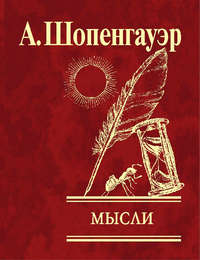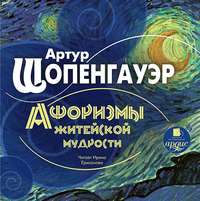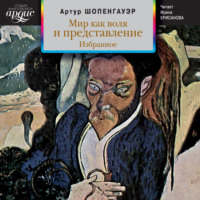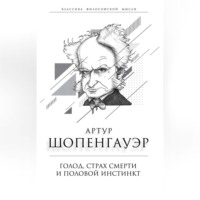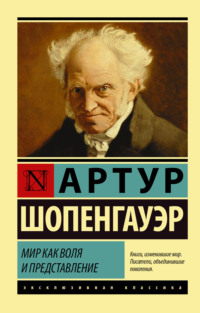 полная версия
полная версияThe World as Will and Idea (Vol. 3 of 3)
In the hour of death it is decided whether the man returns into the womb of nature or belongs no more to nature at all, but – : for this opposite we lack image, conception, and word, just because these are all taken from the objectification of the will, therefore belong to this, and consequently can in no way express the absolute opposite of it, which accordingly remains for us a mere negation. However, the death of the individual is in each case the unweariedly repeated question of nature to the will to live, “Hast thou enough? Wilt thou escape from me?” In order that it may occur often enough, the individual life is so short. In this spirit are conceived the ceremonies, prayers, and exhortations of the Brahmans at the time of death, as we find them preserved in the Upanischad in several places; and so also are the Christian provisions for the suitable employment of the hour of death by means of exhortation, confession, communion, and extreme unction: hence also the Christian prayers for deliverance from sudden death. That at the present day it is just this that many desire only proves that they no longer stand at the Christian point of view, which is that of the denial of the will to live, but at that of its assertion, which is the heathen point of view.
But he will fear least to become nothing in death who has recognised that he is already nothing now, and who consequently no longer takes any share in his individual phenomenon, because in him knowledge has, as it were, burnt up and consumed the will, so that no will, thus no desire for individual existence, remains in him any more.
Individuality inheres indeed primarily in the intellect; and the intellect, reflecting the phenomenon, belongs to the phenomenon, which has the principium individuationis as its form. But it inheres also in the will, inasmuch as the character is individual: yet the character itself is abolished in the denial of the will. Thus individuality inheres in the will only in its assertion, not in its denial. Even the holiness which is connected with every purely moral action depends upon the fact that such an action ultimately springs from the immediate knowledge of the numerical identity of the inner nature of all living things.47 But this identity only really exists in the condition of the denial of the will (Nirvana), for the assertion of the will (Sansara) has for its form the phenomenal appearance of it in multiplicity. Assertion of the will to live, the phenomenal world, the diversity of all beings, individuality, egoism, hatred, wickedness, all spring from one root; and so also, on the other hand, do the world as thing in itself, the identity of all beings, justice, benevolence, the denial of the will to live. If now, as I have sufficiently proved, even the moral virtues spring from the consciousness of that identity of all beings, but this lies, not in the phenomenon, but only in the thing in itself, in the root of all beings, the moral action is a momentary passing through the point, the permanent return to which is the denial of the will to live.
It follows, as a deduction from what has been said, that we have no ground to assume that there are more perfect intelligences than that of human beings. For we see that even this degree of intelligence is sufficient to impart to the will that knowledge in consequence of which it denies and abolishes itself, upon which the individuality, and consequently the intelligence, which is merely a tool of individual, and therefore animal nature, perish. This will appear to us less open to objection if we consider that we cannot conceive even the most perfect intelligences possible, which for this end we may experimentally assume, existing through an endless time, which would be much too poor to afford them constantly new objects worthy of them. Because the nature of all things is at bottom one, all knowledge of them is necessarily tautological. If now this nature once becomes comprehended, as by those most perfect intelligences it soon would be comprehended, what would then remain but the wearisomeness of mere repetition through an infinite time? Thus from this side also we are pointed to the fact that the end of all intelligence can only be reaction upon the will; since, however, all willing is an error, it remains the last work of intelligence to abolish the willing, whose ends it had hitherto served. Accordingly even the most perfect intelligence possible can only be a transition step to that to which no knowledge can ever extend: indeed such an intelligence can, in the nature of things, only assume the position of the moment of the attainment of perfect insight.
In agreement with all these considerations, and also with what is proved in the second book as to the origin of knowledge in the will, the assertion of which it reflects in fulfilling the sole function of knowledge, that of being serviceable to the ends of the will, while true salvation lies in its denial, we see all religions at their highest point pass over into mysticism and mysteries, i. e., into darkness and veiled obscurity, which for knowledge signify merely an empty spot, the point where knowledge necessarily ceases; therefore for thought this can only be expressed by negations, but for sense perception it is indicated by symbolical signs; in temples by dim light and silence; in Brahmanism indeed by the required suspension of all thought and perception for the sake of sinking oneself profoundly in the grounds of one's own being, mentally pronouncing the mysterious Oum.48 Mysticism in the widest sense is every guidance to the immediate consciousness of that to which neither perception nor conception, thus in general no knowledge extends. The mystic is thus opposed to the philosopher by the fact that he begins from within, while the philosopher begins from without. The mystic starts from his inner, positive, individual experience, in which he finds himself to be the eternal and only being, &c. But nothing of this is communicable except the assertions which one has to accept upon his word; consequently he cannot convince. The philosopher, on the other hand, starts from what is common to all, from the objective phenomenon which lies before all, and from the facts of consciousness as they are present in all. His method is therefore reflection upon all this, and combination of the data given in it: accordingly he can convince. He ought therefore to beware of falling into the way of the mystics, and, for example, by the assertion of intellectual intuitions or pretended immediate apprehensions of the reason, to seek to make a vain show of positive knowledge of that which is for ever inaccessible to all knowledge, or at the most can be indicated by means of a negation. The value and worth of philosophy lies in the fact that it rejects all assumptions which cannot be established, and takes as its data only what can be certainly proved in the world given in external perception, in the forms of apprehension of this world, which are constitutive of our intellect, and in the consciousness of one's own self which is common to all. Therefore it must remain cosmology, and cannot become theology. Its theme must limit itself to the world; to express in all aspects what this is, what it is in its inmost nature, is all that it can honestly achieve. Now it answers to this that my system when it reaches its highest point assumes a negative character, thus ends with a negation. It can here speak only of what is denied, given up: but what is thereby won, what is laid hold of, it is obliged (at the conclusion of the fourth book) to denote as nothing, and can only add the consolation that it is merely a relative, not an absolute nothing. For if something is none of all the things which we know, it is certainly for us, speaking generally, nothing. But it does not yet follow from this that it is absolutely nothing, that from every possible point of view and in every possible sense it must be nothing, but only that we are limited to a completely negative knowledge of it, which may very well lie in the limitation of our point of view. Now it is just here that the mystic proceeds positively, and therefore it is just from this point that nothing but mysticism remains. However, any one who wishes this kind of supplement to the negative knowledge to which alone philosophy can guide him will find it in its most beautiful and richest form in the Oupnekhat, then also in the Enneads of Plotinus, in Scotus Erigena, in passages of Jakob Böhm, but especially in the marvellous work of Madame de Guion, Les Torrens, and in Angelus Silesius; finally also in the poems of the Sufis, of which Tholuk has given us a collection translated into Latin, and another translated into German, and in many other works. The Sufis are the Gnostics of Islam. Hence Sadi denotes them by a word which may be translated “full of insight.” Theism, calculated with reference to the capacity of the multitude, places the source of existence without us, as an object. All mysticism, and so also Sufism, according to the various degrees of its initiation, draws it gradually back within us, as the subject, and the adept recognises at last with wonder and delight that he is it himself. This procedure, common to all mysticism, we find not only expressed by Meister Eckhard, the father of German mysticism, in the form of a precept for the perfect ascetic, “that he seek not God outside himself” (Eckhard's works, edited by Pfeiffer, vol. i. p. 626), but also very naïvely exhibited by Eckhard's spiritual daughter, who sought him out, when she had experienced that conversion in herself, to cry out joyfully to him, “Sir, rejoice with me, I have become God” (loc. cit., p. 465). The mysticism of the Sufis also expresses itself throughout precisely in accordance with this spirit, principally as a revelling in the consciousness that one is oneself the kernel of the world and the source of all existence, to which all returns. Certainly there also often appears the call to surrender all volition as the only way in which deliverance from individual existence and its suffering is possible, yet subordinated and required as something easy. In the mysticism of the Hindus, on the other hand, the latter side comes out much more strongly, and in Christian mysticism it is quite predominant, so that pantheistic consciousness, which is essential to all mysticism, here only appears in a secondary manner, in consequence of the surrender of all volition, as union with God. Corresponding to this difference of the conception, Mohammedan mysticism has a very serene character, Christian mysticism a gloomy and melancholy character, while that of the Hindus, standing above both, in this respect also holds the mean.
Quietism, i. e., surrender of all volition, asceticism, i. e., intentional mortification of one's own will, and mysticism, i. e., consciousness of the identity of one's own nature with that of all things or with the kernel of the world, stand in the closest connection; so that whoever professes one of them is gradually led to accept the others, even against his intention. Nothing can be more surprising than the agreement with each other of the writers who present these doctrines, notwithstanding the greatest difference of their age, country, and religion, accompanied by the firm certainty and inward confidence with which they set forth the permanence of their inner experience. They do not constitute a sect, which adheres to, defends, and propagates a favourite dogma once laid hold of; indeed the Indian, Christian, and Mohammedan mystics, quietists, and ascetics are different in every respect, except the inner significance and spirit of their teaching. A very striking example of this is afforded by the comparison of the Torrens of Madame de Guion with the teaching of the Vedas, especially with the passage in the Oupnekhat, vol. i. p. 63, which contains the content of that French work in the briefest form, but accurately and even with the same images, and yet could not possibly have been known to Madame de Guion in 1680. In the “Deutschen Theologie” (the only unmutilated edition, Stuttgart, 1851) it is said in chapters 2 and 3 that both the fall of the devil and that of Adam consisted in the fact that the one as the other ascribed to himself the I and me, the mine and to me, and on p. 89 it is said: “In true love there remains neither I nor me, mine, to me, thou, thine, and the like.” Now, corresponding to this, it is said in the “Kural,” from the Tamilian by Graul, p. 8: “The passion of the mine directed outwardly, and that of the I directed inwardly, cease” (cf. ver. 346). And in the “Manual of Buddhism” by Spence Hardy, p. 258, Buddha says: “My disciples reject the thoughts I am this, or this is mine.” In general, if we look away from the forms which are introduced by external circumstances and go to the bottom of the matter, we will find that Sakya Muni and Meister Eckhard teach the same; only that the former dared to express his thoughts directly, while the latter is obliged to clothe them in the garments of the Christian myth and adapt his expressions to this. He carries this, however, so far that with him the Christian myth has become little more than a symbolical language, just as the Hellenic myth became for the Neo-Platonists: he takes it throughout allegorically. In the same respect it is worth noticing that the transition of St. Francis from prosperity to the mendicant life is similar to the still greater step of Buddha Sakya Muni from prince to beggar, and that, corresponding to this, the life of St. Francis, and also the order he founded, was just a kind of Sannyasiism. Indeed it deserves to be mentioned that his relationship with the Indian spirit appears also in his great love for the brutes and frequent intercourse with them, when he always calls them his sisters and brothers; and his beautiful Cantico also bears witness to his inborn Indian spirit by the praise of the sun, the moon, the stars, the wind, the water, the fire, and the earth.49
Even the Christian quietists must often have had little or no knowledge of each other; for example, Molinos and Madame de Guion of Tauler and the “Deutsche Theologie,” or Gichtel of the former. In any case, the great difference of their culture, in that some of them, like Molinos, were learned, others, like Gichtel and many more, were the reverse, has no essential influence upon their teaching. Their great internal agreement, along with the firmness and certainty of their utterances, proves all the more that they speak from real inward experience, from an experience which certainly is not accessible to all, but is possessed only by a few favoured individuals, and therefore has received the name of the work of grace, the reality of which, however, for the above reasons, is not to be doubted. But in order to understand all this one must read the mystics themselves, and not be contented with second-hand reports of them; for every one must himself be comprehended before one judges concerning him. Thus to become acquainted with quietism I specially recommend Meister Eckhard, the “Deutsche Theologie,” Tauler, Madame de Guion, Antoinette Bourignon, the English Bunyan, Molinos50 and Gichtel. In the same way, as practical proofs and examples of the profound seriousness of asceticism, the life of Pascal, edited by Reuchlin, together with his history of the Port-Royal, and also the Histoire de Sainte Elisabeth, par le comte de Montalembert, and La vie de Rancé, par Chateaubriand, are very well worth reading, but yet by no means exhaust all that is important in this class. Whoever has read such writings, and compared their spirit with that of ascetism and quietism as it runs through all works of Brahmanism and Buddhism, and speaks in every page, will admit that every philosophy, which must in consistency reject that whole mode of thought, which it can only do by explaining the representatives of it to be either impostors or mad-men, must just on this account necessarily be false. But all European systems, with the exception of mine, find themselves in this position. Truly it must be an extraordinary madness which, under the most widely different circumstances and persons possible, spoke with such agreement, and, moreover, was raised to the position of a chief doctrine of their religion, by the most ancient and numerous peoples of the earth, something like three-fourths of all the inhabitants of Asia. But no philosophy can leave the theme of quietism and asceticism undecided if the question is proposed to it; because this theme is, in its matter, identical with that of all metaphysics and ethics. Here then is a point upon which I expect and desire that every philosophy, with its optimism, should declare itself. And if, in the judgment of contemporaries, the paradoxical and unexampled agreement of my philosophy with quietism and asceticism appears as an open stumbling-block, I, on the contrary, see just in that agreement a proof of its sole correctness and truth, and also a ground of explanation of why it is ignored and kept secret by the Protestant universities.
For not only the religions of the East, but also true Christianity, has throughout that ascetic fundamental character which my philosophy explains as the denial of the will to live; although Protestantism, especially in its present form, seeks to conceal this. Yet even the open enemies of Christianity who have appeared in the most recent times have ascribed to it the doctrines of renunciation, self-denial, perfect chastity, and, in general, mortification of the will, which they quite correctly denote by the name of the “anti-cosmic tendency,” and have fully proved that such doctrines are essentially proper to original and genuine Christianity. In this they are undeniably right. But that they set up this as an evident and patent reproach to Christianity, while just here lies its profoundest truth, its high value, and its sublime character, – this shows an obscuring of the mind, which can only be explained by the fact that these men's minds, unfortunately like thousands more at the present day in Germany, are completely spoiled and distorted by the miserable Hegelism, that school of dulness, that centre of misunderstanding and ignorance, that mind-destroying, spurious wisdom, which now at last begins to be recognised as such, and the veneration of which will soon be left to the Danish Academy, in whose eyes even that gross charlatan is a summus philosophus, for whom it takes the field: —
“Car ils suivront la créance et estude,De l'ignorante et sotte multitude,Dont le plus lourd sera reça pour juge.”– Rabelais.In any case, the ascetic tendency is unmistakable in the genuine and original Christianity as it developed in the writings of the Church Fathers from its kernel in the New Testament; it is the summit towards which all strives upwards. As its chief doctrine we find the recommendation of genuine and pure celibacy (this first and most important step in the denial of the will to live), which is already expressed in the New Testament.51 Strauss also, in his “Life of Jesus” (vol i. p. 618 of the first edition), says, with reference to the recommendation of celibacy given in Matt. xix. 11 seq., “That the doctrine of Jesus may not run counter to the ideas of the present day, men have hastened to introduce surreptitiously the thought that Jesus only praised celibacy with reference to the circumstances of the time, and in order to leave the activity of the Apostles unfettered; but there is even less indication of this in the context than in the kindred passage, 1 Cor. vii. 25 seq.; but we have here again one of the places where ascetic principles, such as prevailed among the Essenes, and probably still more widely among the Jews, appear in the teaching of Jesus also.” This ascetic tendency appears more decidedly later than at the beginning, when Christianity, still seeking adherents, dared not pitch its demands too high; and by the beginning of the third century it is expressly urged. Marriage, in genuine Christianity, is merely a compromise with the sinful nature of man, as a concession, something allowed to those who lack strength to aspire to the highest, an expedient to avoid greater evil: in this sense it receives the sanction of the Church in order that the bond may be indissoluble. But celibacy and virginity are set up as the higher consecration of Christianity through which one enters the ranks of the elect. Through these alone does one attain the victor's crown, which even at the present day is signified by the wreath upon the coffin of the unmarried, and also by that which the bride lays aside on the day of her marriage.
A piece of evidence upon this point, which certainly comes to us from the primitive times of Christianity, is the pregnant answer of the Lord, quoted by Clemens Alexandrinus (Strom. iii. 6 et 9) from the Gospel of the Egyptians: “Τῃ Σαλωμῃ ὁ κυριος πυνθανομενῃ, μεχρι ποτε θανατος ισχυσει; μεχρις αν ειπεν, ὑμεις, αἱ γυναικες, τικτετε” (Salomæ interroganti quousque vigebit mors?Dominus guoadlusque inguit vos, mulieres, paritis). “Τουτ᾽ εστι, μεχρις αν αἱ επιθυμιαι ενεργωσι” (Hoc est, quamdiu operabuntur cupiditates), adds Clement, c. 9, with which he at once connects the famous passage, Rom. v. 12. Further on, c. 13, he quotes the words of Cassianus: “Πυνθανομενης της Σαλωμης, ποτε γνωσθησεται τα περι ὡν ηρετο, εφη ὁ κυριος, ᾽Οταν της αισχυνς ενδυμα πατησετε, και ὁταν γενηται τα δυο ἑν, και το αρρεν μετα της θηλειας ουτε αρρεν, ουτε θηλυ” (Cum interrogaret Salome, quando cognoscentur ea, de quibus interrogabat, ait Dominus: quando pudoris indumentum conculcaveritis, et quando duo facto fuerint unum, et masculum cum fæmina nec masculum, nec fæminium), i. e., when she no longer needs the veil of modesty, since all distinction of sex will have disappeared.
With regard to this point the heretics have certainly gone furthest: even in the second century the Tatianites or Encratites, the Gnostics, the Marcionites, the Montanists, Valentinians, and Cassians; yet only because with reckless consistency they gave honour to the truth, and therefore, in accordance with the spirit of Christianity, they taught perfect continence; while the Church prudently declared to be heresy all that ran counter to its far-seeing policy. Augustine says of the Tatianites: “Nuptias damnant, atque omnino pares eas fornicationibus aliisque corruptionibus faciunt: nec recipiunt in suum numerum conjugio utentem, sive marem, sive fœminam. Non vescunlur carnibus, easque abominantur.” (De hœresi ad quod vult Deum. hœr., 25.) But even the orthodox Fathers look upon marriage in the light indicated above, and zealously preach entire continence, the ἁγνεια. Athanasius gives as the cause of marriage: “Ὁτι υποπιπτοντες εσμεν τῃ του προπατορος καταδικῃ … επειδη ὁ προηγουμενος σκοπος του θεου ην, το μη δια γαμου γενεσθαι ἡμας και φθορας; ἡ δε παραβασις της εντολης του γαμον εισηγαγεν δια το ανομησαι τον Αδαμ.” (Quia subjacemus condemnationi propatoris nostri; … nam finis, a Deo prœlatus, erat, nos non per nuptias et corruptionem fieri: sed transgressio mandati nuptias introduxit, propter legis violationem Adœ.—Exposit. in psalm. 50). Tertullian calls marriage genus mali inferioris, ex indulgentia ortum (De pudicitia, c. 16) and says: “Matrimonium et stuprum est commixtio carnis; scilicet cujus concupiscentiam dominus stupro adœquavit. Ergo, inguis, jam et primas, id est unas nuptias destruis? Nec immerito: quoniam et ipsœ ex eo constant, quod est stuprum” (De exhort. castit., c. 9). Indeed, Augustine himself commits himself entirely to this doctrine and all its results, for he says: “Novi quosdam, qui murmurent: quid, si, inquiunt, omnes velint ab omni concubitu abstinere, unde subsistet genus humanum? Utinam omnes hoc vellent! dumtaxat in caritate, de corde puro et conscientia bona, et fide non ficta: multo citius Dei civitas compleretur, ut acceleraretur terminus mundi” (De bono conjugali, c. 10). And again: “Non vos ab hoc studio, quo multos ad imitandum vos excitatis, frangat querela vanorum, qui dicunt: quomodo subsistet genus humanum, si omnes fuerint continentes? Quasi propter aliud retardetur hoc seculum, nisi ut impleatur prœdestinatus numerus ille sanctorum, quo citius impleto, profecto nec terminus seculi differetur” (De bono individuitatis, c. 23). One sees at once that he identifies salvation with the end of the world. The other passages in the works of Augustine which bear on this point will be found collected in the “Confessio Augustiniana e D. Augustini operibus compilata a Hieronymo Torrense,” 1610, under the headings De matrimonio, De cœlibatu, &c., and any one may convince himself from these that in ancient, genuine Christianity marriage was only a concession, which besides this was supposed to have only the begetting of children as its end, that, on the other hand, perfect continence was the true virtue far to be preferred to this. To those, however, who do not wish to go back to the authorities themselves I recommend two works for the purpose of removing any kind of doubt as to the tendency of Christianity we are speaking about: Carové, “Ueber das Cölibatgesetz,” 1832, and Lind, “De cœlibatu Christianorum per tria priora secula,” Havniœ, 1839. It is, however, by no means the views of these writers themselves to which I refer, for these are opposed to mine, but solely to their carefully collected accounts and quotations, which deserve full acceptance as quite trustworthy, just because both these writers are opponents of celibacy, the former a rationalistic Catholic, and the other a Protestant candidate in theology, who speaks exactly like one. In the first-named work we find, vol. i. p. 166, in that reference, the following result expressed: “In accordance with the Church view, as it may be read in canonical Church Fathers, in the Synodal and Papal instructions, and in innumerable writings of orthodox Catholics, perpetual chastity is called a divine, heavenly, angelic virtue, and the obtaining of the assistance of divine grace for this end is made dependent upon earnest prayer. We have already shown that this Augustinian doctrine is by Canisius and in the decrees of the Council of Trent expressed as an unchanging belief of the Church. That, however, it has been retained as a dogma till the present day is sufficiently established by the June number, 1831, of the magazine ‘Der Katholik.’ It is said there, p. 263: ‘In Catholicism the observance of a perpetual chastity, for the sake of God, appears as in itself the highest merit of man. The view that the observance of continual chastity as an end in itself sanctifies and exalts the man is, as every instructed Catholic is convinced, deeply rooted in Christianity, both as regards its spirit and its express precepts. The decrees of the Council of Trent have abolished all possible doubt on this point…’ It must at any rate be confessed by every unprejudiced person, not only that the doctrine expressed by ‘Der Katholik’ is really Catholic, but also that the proofs adduced may be quite irrefutable for a Catholic reason, because they are drawn so directly from the ecclesiastical view, taken by the Church, of life and its destiny.” It is further said in the same work, p. 270: “Although both Paul calls the forbidding to marry a false doctrine, and the still Judaistic author of the Epistle to the Hebrews enjoins that marriage shall be held in honour by all, and the bed kept undefiled (Heb. xiii 4), yet the main tendency of these two sacred writers is not on that account to be mistaken. Virginity is for both the perfect state, marriage only a make-shift for the weak, and only as such to be held inviolable. The highest effort, on the other hand, was directed to complete, material putting off of self. The self must turn and refrain from all that tends only to its own pleasure, and that only temporarily.” Lastly, p. 288: “We agree with the Abbé Zaccaria, who asserts that celibacy (not the law of celibacy) is before everything to be deduced from the teaching of Christ and the Apostle Paul.”


